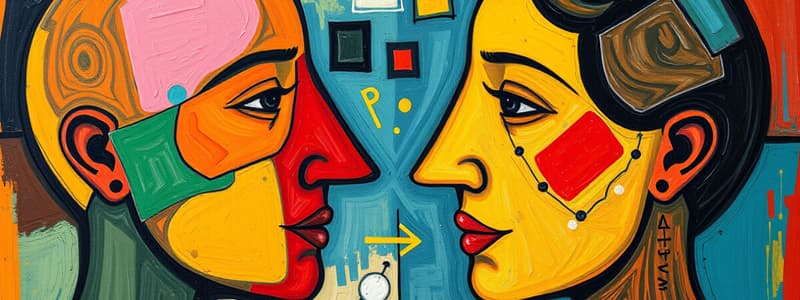Podcast
Questions and Answers
What historical event contributed to the emergence of the 'middle class'?
What historical event contributed to the emergence of the 'middle class'?
- The Enlightenment period
- The American Revolution
- The agricultural revolution
- The industrial revolution (correct)
Which term referred to women who pursued higher education 150 years ago?
Which term referred to women who pursued higher education 150 years ago?
- Feminists
- Blue stockings (correct)
- Intellectuals
- Suffragettes
What group classification did Belgian colonialists use to govern Rwandan society?
What group classification did Belgian colonialists use to govern Rwandan society?
- Bantu and Nilotic
- Hutus and Tutsis (correct)
- Urban and Rural
- Wealthy and Poor
According to Foucault, what concept refers to the ways through which populations are regulated?
According to Foucault, what concept refers to the ways through which populations are regulated?
What did Foucault argue these processes of governance produced?
What did Foucault argue these processes of governance produced?
Which of the following is NOT considered a category derived from contemporary governance processes according to Foucault?
Which of the following is NOT considered a category derived from contemporary governance processes according to Foucault?
What does 'discourse' refer to in the context of social constructionism?
What does 'discourse' refer to in the context of social constructionism?
Which of the following ideas is generally associated with the discourse of 'personality'?
Which of the following ideas is generally associated with the discourse of 'personality'?
What does the term 'underclass' refer to in the context of social categories?
What does the term 'underclass' refer to in the context of social categories?
Which period is characterized by the proliferation of classification systems according to Foucault?
Which period is characterized by the proliferation of classification systems according to Foucault?
What does the core tenet of social constructionism suggest about our perceptions of the world?
What does the core tenet of social constructionism suggest about our perceptions of the world?
In the context of social constructionism, what is the significance of language?
In the context of social constructionism, what is the significance of language?
According to social constructionism, how has the societal focus on body size changed over time?
According to social constructionism, how has the societal focus on body size changed over time?
How do cultural and historical contexts influence social constructionism?
How do cultural and historical contexts influence social constructionism?
What are the primary characteristics that define trees in social constructionism?
What are the primary characteristics that define trees in social constructionism?
Which example illustrates the concept of social constructionism effectively?
Which example illustrates the concept of social constructionism effectively?
What is a key interest of social constructionists regarding defining characteristics of objects?
What is a key interest of social constructionists regarding defining characteristics of objects?
Which statement best reflects the relationship between language and social perceptions?
Which statement best reflects the relationship between language and social perceptions?
Flashcards are hidden until you start studying
Study Notes
Social Constructionism and Language
- Social constructionism posits that our understanding of the world is shaped by language, rather than reflecting an objective reality.
- Perception of objects like trees results from linguistic classifications (e.g., flowers, shrubs) rather than intrinsic characteristics.
- Current societal focus on body size (thin vs. fat) illustrates changing perceptions influenced by cultural discourse, rather than timeless distinctions.
- Certain properties of objects or people gain importance through societal valuation, impacting social and scientific evaluations.
Cultural and Historical Specificity
- Classification systems vary across cultures and historical contexts; for instance, the concept of class in European societies has evolved over time.
- The notion of "middle class" arose during the Industrial Revolution, reflecting socio-economic shifts.
- Historical exclusions, such as women's access to higher education, demonstrate how cultural perceptions and categories can change.
- The Rwandan genocide highlighted constructed identities (Hutus and Tutsis) rooted in colonial governance, illustrating how classifications can have dire consequences.
Michel Foucault's Contribution
- Foucault analyzed the proliferation of categorization processes during the Enlightenment, linking them to societal changes like urbanization and industrialization.
- He described "governance" as the means through which societies regulate populations, creating historically contingent categories (e.g., academic ability, sexual orientation).
- Contemporary categories reflect the needs of capitalist economies, emphasizing productivity and compliance among individuals.
Discourse and Disciplinary Power
- Discourse encompasses culturally significant ideas that shape understanding of societal behaviors and events.
- Common discourses, such as personality or disposition, suggest that behavior is primarily derived from internal traits and motivations.
- Not every idea qualifies as discourse; for example, categories like "fruit" lack broad cultural significance necessary to construct meaning systems.
Studying That Suits You
Use AI to generate personalized quizzes and flashcards to suit your learning preferences.




